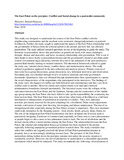| dc.description.abstract | This study was designed to understand the context of the East Pokot conflict with the neighbouring communities and the resultant socio-economic changes/adjustments on pastoral livelihoods. Further, the study sought to understand the nature of the East Pokot relationship with the government of Kenya from the colonial period to the present and how this. has affected pastoralism. The study utilized research questions set out at the beginning to guide the study. The literature on pastoralism shows that pastoralists in general are faced with many challenges: drought, disease and insecurity, and have. an uneasy relationship with government. This is out cf their desire to move freely as pastoralism dictates and the government's intend to put them under control. Government legal and policy reforms have led to the alienation of the most productive pastoral land thereby leading to strained relations.
The theoretical framework utilized to guide the study was: rational choice theory, conflict theory and modernization theory. The study utilized a qualitative approach in the data collection and analysis process. Primary sources of data were focus group discussions, group discussions, key informant interviews and observation. Secondary data was obtained through review of archival materials and other government documents. Quantitative data was obtained through administration short questionnaire to capture the social characteristics of the respondents who participated in the interviews. The findings of the study were: the triggers of conflict are both historical and contemporary and they vary from conflict zone to another.
However claims and counter claims over land and contested administrative boundaries featured prominently. The historical causes were the collapse of the oath taken between the East Pokot and the Samburu, Njemps and the carelessness of the middle age-group among the East Pokot who have failed to take up the responsibility the community has bestowed on them. The East Pokot have now delved into other forms of livelihood as a fall back mechanism or enhancement of pastoralism in response to conflict.. They now undertake activities previously reserved for the poor (chepleng) for a livelihood. Other social adjustments include: cultivation of crops, beer brewing, bee keeping and labour employment. The rise of an entrepreneurial ethic especially among the East Pokot women' is impressive.
They now dominate small scale enterprises in the shopping centres - food, kiosks, hotels, grocery shops, honey etc The rise of the indigenous East Pokot businessmen who now dominate the livestock trade is particularly intriguing. Enclosure of common land especially in Churo area is a new phenomenon as people begin to take a more or less permanent claim to land. The rise of alcoholism and the deviant moran reflect a moral decline among the East Pokot. The relationship between the East Pokot, the colonial and independent Kenya government has been strained to the present especially following unpopular government policies towards them. The study concludes that unless the conflicts are urgently resolved the future of East Pokot pastoralism remains in jeopardy due to an increasingly shrinking resource base.
The prospect of the East Pokot pastoralism sliding further down the precipice remains real unless the security situation is sustainably resolved. However, the rise of alternatives to pastoralism is a discernible adjustment mechanism which should be enhanced. The study recommends the. following: diversification of pastoralists economy is needed and important in order to reduce over-reliance on livestock; insecurity among pastoralists arid/or agro-pastrolists could be sustainably resolved through utilization of historical records and by itltpartial negotiators; insecurity is a national problem and should receive national attention. At a research level, the study recommends a regional study of conflict between pastoralists in order to appreciate its character, scale and impact. A study of the cost of conflict on thepastoralists households remains a potential area of social research. | en_US |

